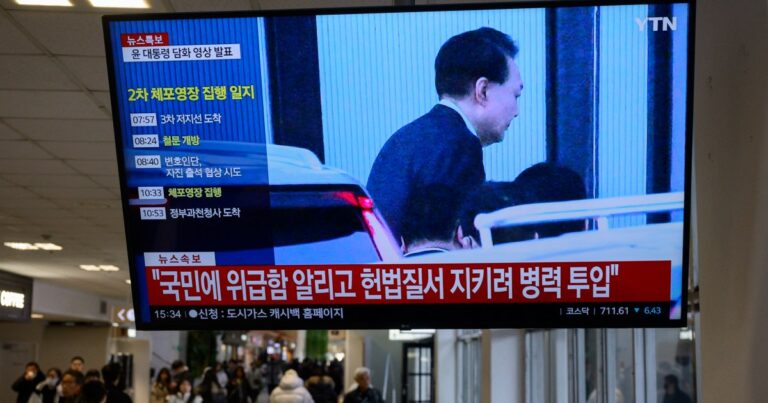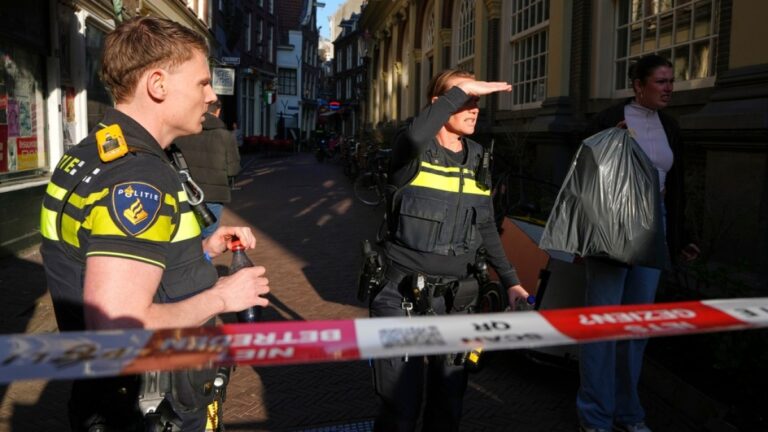Ukraine has stopped supplying Russian gas to Europe
Ukraine stopped transporting Russian gas through its pipeline network to European customers on Wednesday after a pre-war transit agreement expired at the end of last year.
Ukraine’s Energy Minister Herman Halushenko confirmed on Wednesday morning that Kyiv had stopped the transit “in the interest of national security”.
“This is a historic event. Russia is losing markets and will suffer financial losses. Europe has already decided to phase out Russian gas and (this) is in line with what Ukraine is doing today,” Halushchenko said in an update on the Telegram messaging app. .
At a summit in Brussels last month, Ukrainian President Volodymyr Zelensky promised that Kiev would not allow Moscow to earn “extra billions… on our blood, the lives of our citizens” using transits. But he briefly held open the possibility that gas flows would continue if payments to Russia were suspended until the end of the war.

Kyiv refuses to extend the contract
The Russian gas company “Gazprom” said in a statement on Wednesday morning that it “has no technical and legal possibility” to send gas from the territory of Ukraine due to Kiev’s refusal to extend the contract.
Even as Russian troops and tanks entered Ukraine in 2022, Russian natural gas continued to flow to Europe through the country’s pipeline network, built when Ukraine and Russia were part of the Soviet Union, under a five-year deal. Gazprom earned money from gas, and Ukraine collected transit fees.
Before the war, Russia provided about 40 percent of the European Union’s natural gas pipeline. The gas flowed through four pipeline systems, one through the Baltic Sea, one through Belarus and Poland, one through Ukraine, and one through the Black Sea from Turkey to Bulgaria.
The Russian gas cut caused Europe’s energy crisis
After the start of the war, Russia cut off most of its supplies through the Baltic and Belarus-Poland pipelines, citing disputes over the demand for payment in rubles. The Baltic pipeline was blown up in an act of sabotage, but the details of the attack remain murky.
Russia’s blackout has caused an energy crisis in Europe. Germany has had to fork out billions of euros to build floating terminals to import liquefied natural gas, which comes by ship rather than by pipeline. As prices increased, users decreased. Norway and the United States filled the gap, becoming the two largest suppliers.
Europe described the Russian suspension as energy blackmail and announced plans to completely eliminate Russian gas imports by 2027.
Russia’s share of the EU pipeline natural gas market has fallen sharply to around eight percent in 2023, according to data from the EU Commission. Ukraine’s transit route served EU members Austria and Slovakia, which have long received the bulk of their natural gas from Russia but have recently struggled to diversify supplies.
Among the worst hit will be EU candidate Moldova, which receives Russian gas via Ukraine and has taken emergency measures as residents brace for a harsh winter and looming power outages.
Ukrainian prisoners of war were reunited with their families in an emotional scene after being freed in a major swap between their country and Russia on Monday. One former inmate said his five-year-old son probably didn’t recognize him because he saw him when he was two.
On Wednesday, Polish Foreign Minister Radek Sikorski called Ukraine’s move to freeze supplies a “victory” for those opposed to Kremlin policy. In a post on X, Sikorsky accused Moscow of trying to “blackmail Eastern Europe by threatening to cut off gas supplies,” including the Baltic pipeline, which bypasses Ukraine and Poland and goes straight to Germany.
“Impact all of us in the EU”: Slovakia’s prime minister
Slovak Prime Minister Robert Fico said on Wednesday that the suspension of gas flows through Ukraine “will seriously affect not only Russia, but all of us in the EU”.
Fico, whose views on Russia diverge sharply from the European mainstream, previously criticized Kiev’s refusal to extend the transit agreement and threatened to cut off electricity supplies to Ukraine in response.
Moscow can still send gas to Hungary, as well as non-EU countries Turkey and Serbia through the Turkish Stream pipeline through the Black Sea.
The steady decrease in the supply of Russian gas to European countries has also prompted them to accelerate the integration of Ukraine’s energy networks with its western neighbors.









